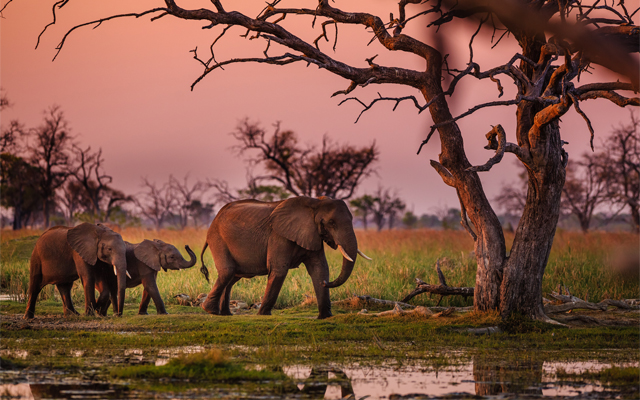Botswana Tourism has spoken up in support of the government’s controversial decision to reverse a ban on elephant hunting, with some speculating that the country’s tourism would suffer as a result of backlash.
The decision to lift the ban imposed in 2014 has in the past week been criticised by conservationists who say it enables archaic and cruel practices.

However, Botswana Tourism’s marketing executive – Eco-Tourism, Dawson Kgosi Ramsden, argued that hunting has long co-existed with conservation efforts in the country.
“Botswana only put a ban on hunting five years ago. Yet we have long been known for luxury (travel) and the conservation-minded nation that we are. We were the first African tribe to proclaim a game reserve in 1963. Before and after that, we were doing boar hunting side by side with photographic safaris,” Ramsden told TTG Asia on the sidelines of ILTM Asia Pacific.
“We are a country the size of France or 1.5 times the size of Japan. Forty per cent of our land is reserved for wildlife management areas or conservation areas, long before any other country had that kind of conservation policy.”
In the five years the ban was in effect, the country saw “huge expansion in wildlife population especially elephants”, which has contributed to human-wildlife conflict, according to Ramsden.
“Elephants are encroaching into human areas. Conservationists are up in arms (over the lifting of our hunting ban) on social media. But what you won’t see on social media is how many people are being killed by elephants in Botswana.”
“We are a sovereign state – we have to make decisions that are best for both commodities and resources, as well as for our people. We can’t have someone in America, who doesn’t have elephants and doesn’t understand wildlife management principles, dictate without offering a viable alternative solution.”
Elephant numbers are going up only in Botswana, he said. The country is surrounded by South Africa, Zambia, Zimbabwe and Namibia. Poaching activities and civil conflicts in these countries have been contributing to the migration of elephants into Botswana.
Ramsden believes “a large part of the tourism community is behind Botswana” in its decision to allow hunting again. It is not necessarily the trophy hunting niche who are in support, rather “those who have been visiting Botswana and have an understanding of the country’s policies”, according to Ramsden.
The country derives most of its tourism receipts from American and European tourists, but arrivals from Asia, especially India and China, have been slowly growing in recent years.
At India’s Ambe World Travels, demand for wildlife tourism in Africa has been picking up around 10 per cent annually in the past few years, shared Aneesh Jalsi, managing partner.
While some of his clients are trophy hunters, he is unsure if many will choose Botswana even with the ban now lifted. “Visa is an issue… Another consideration is how they can bring the ‘trophy’ home. A lot of them want to ‘showcase’ animals hunted overseas, but it is not easy to transport these.”
Hunting for sport and trophy is an activity familiar to many Indians to this day. Kalsi has had clients who go on 15-day trips to South Africa exclusively to hunt.
On the other hand, he acknowledged that “a lot of clients find (trophy hunting) to be unethical”.
Tim Wang of Taiwan’s Tristar Travel does not expect the controversial decision to affect his clients’ desire to visit the country. The agency has in recent years been responding to new demands and challenges by offering more destinations farther afield, including Antarctica, Kenya and other African destinations.
In Taiwan – which has seen its fair share of debates surrounding hunting, conservation and politics – many are already sensitised to the different sides of the dilemma.
Wang said the increasing number of clients choosing Botswana are hence unlikely to be swayed by the reversal of the hunting ban. They simply want to experience the highlights, that is to “see the animals and witness wildlife migration.”




















